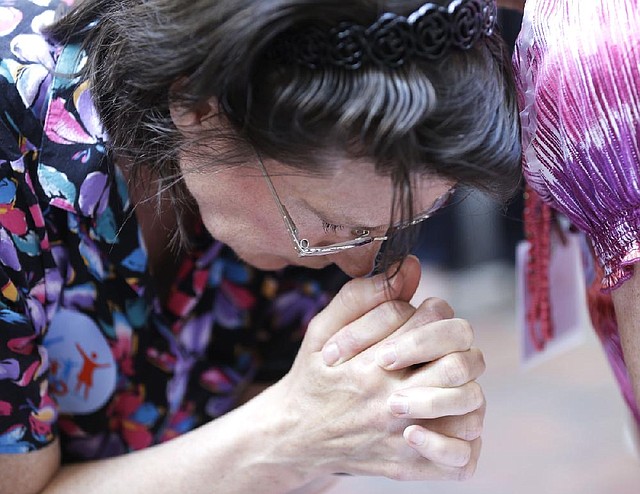Jurists hear arguments in Virginia gay-marriage case
Traditional marriage supporter Barbara Kerns of Midlothain, Va., prays Tuesday outside the federal appeals court in Richmond, Va.
Wednesday, May 14, 2014
RICHMOND, Va. -- Federal appeals court judges aggressively questioned lawyers on both sides of Virginia's gay-marriage case Tuesday, and a judge in Idaho ruled that state's ban is unconstitutional.
In Virginia, the three-judge panel of the 4th U.S. Circuit Court of Appeals hinted at varying stances as they grilled attorneys for four couples challenging the state's same-sex marriage prohibition and lawyers for two circuit court clerks defending it. A decision is expected in a few weeks on an issue that both sides believe ultimately will be decided by the U.S. Supreme Court.
U.S. District Judge Arenda Wright Allen ruled in February that Virginia's constitutional amendment and laws barring gay marriage and denying recognition of such unions performed in other states violate the U.S. Constitution's equal protection and due process guarantees.
On Tuesday, 4th Circuit Judge Roger Gregory challenged lawyers defending the ban on their assertion that the state has a right to limit marriage to people who can procreate. Same-sex couples can have children, too, Gregory said.
"Not the same way," said Austin Nimocks, attorney for one of the clerks.
"As long as they get to have families, what difference does it make?" Gregory asked.
Circuit Judge Paul Niemeyer, however, described marriage as a fundamental right that historically has focused on preserving stable families.
"It seems to me a state might be able to latch onto that and say we want to continue that," Niemeyer said.
Judge Henry Floyd asked fewer questions than his colleagues, but he did inquire why Virginia would want to deny recognition of same-sex marriages in other states. Nimocks said requiring such recognition would amount to "an end run" around the public policy behind the ban.
Virginia voters in 2006 voted 57 percent to 43 percent to approve the constitutional amendment banning gay marriage.
"Marriage is a fundamental right, but Virginia voters have spoken. They've decided not to extend that right to same-sex couples," said David Oakley, attorney for the other clerk.
Attorneys for the same-sex couples argued that legally adopted provisions still must fall if they violate the U.S. Constitution.
"Virginia's marriage laws single out for discrimination a class of Virginians based on the sexual orientation and gender of the person they love," said Theodore Olson, attorney for two of the couples.
Attorneys for the two sides also disagreed on whether the U.S. Supreme Court decision in Loving v. Virginia, which struck down interracial marriage bans in 1967, provided the basis for also invalidating prohibitions on same-sex marriage. Allen relied heavily on that case in her ruling.
Outside the courthouse, hundreds of demonstrators gathered, holding signs and shouting competing slogans. Supporters of the ban on gay marriage outnumbered opponents by a wide margin. They carried signs saying "Every Child Deserves a Mom & a Dad" and chanted "one woman, one man."
"We're here to support the traditional definition of marriage, not to alienate or [disrespect] the other side," said Bill Heipp of Midlothian, a Family Foundation of Virginia volunteer.
Supporters of the gay couples chanted "marriage equality now" and cheered when the couples left the courthouse hand-in-hand.
Carol Schall and Mary Townley, joined Timothy Bostic and Tony London of Norfolk in challenging the gay marriage ban. Two other same-sex couples, Joanne Harris and Jessica Duff of Staunton and Christy Berghoff and Victoria Kidd of Winchester, filed a similar lawsuit in Harrisonburg and were allowed to intervene in the case before the appeals court.
Virginia Attorney General Mark Herring is supporting the plaintiffs, and his solicitor general urged the court Tuesday to uphold Allen's ruling.
A decision overturning Virginia's ban could affect similar prohibitions in West Virginia, North Carolina and South Carolina, which also are in the 4th Circuit. Maryland, also in the circuit, is one of 17 states that allow gay marriage.
In Idaho on Tuesday evening, U.S. District Magistrate Judge Candy Dale wrote in a ruling that the state's laws banning same-sex marriage unconstitutionally deny gay citizens of their fundamental right to marry.
Dale said marriage works a fundamental change on the lives of all who experience it and that it holds immense personal and spiritual significance. She said Idaho's laws wrongly stigmatize gay couples and relegate their families to second-class status without sufficient reason.
Gov. C.L. "Butch" Otter has already said he intends to appeal the case.
A Section on 05/14/2014

